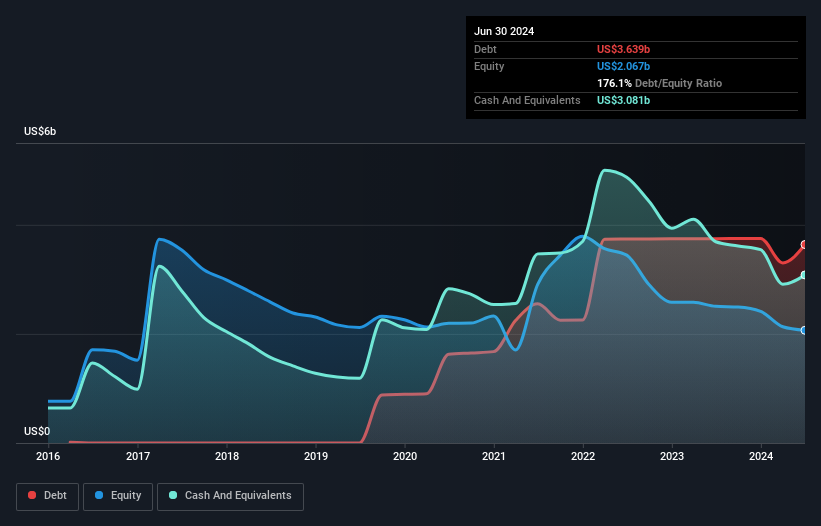- United States
- /
- Interactive Media and Services
- /
- NYSE:SNAP
Snap (NYSE:SNAP) Is Making Moderate Use Of Debt
Legendary fund manager Li Lu (who Charlie Munger backed) once said, 'The biggest investment risk is not the volatility of prices, but whether you will suffer a permanent loss of capital.' So it might be obvious that you need to consider debt, when you think about how risky any given stock is, because too much debt can sink a company. We can see that Snap Inc. (NYSE:SNAP) does use debt in its business. But the more important question is: how much risk is that debt creating?
When Is Debt A Problem?
Debt is a tool to help businesses grow, but if a business is incapable of paying off its lenders, then it exists at their mercy. If things get really bad, the lenders can take control of the business. However, a more common (but still painful) scenario is that it has to raise new equity capital at a low price, thus permanently diluting shareholders. Of course, debt can be an important tool in businesses, particularly capital heavy businesses. The first thing to do when considering how much debt a business uses is to look at its cash and debt together.
View our latest analysis for Snap
How Much Debt Does Snap Carry?
The chart below, which you can click on for greater detail, shows that Snap had US$3.64b in debt in June 2024; about the same as the year before. However, because it has a cash reserve of US$3.08b, its net debt is less, at about US$557.5m.

How Strong Is Snap's Balance Sheet?
We can see from the most recent balance sheet that Snap had liabilities of US$1.11b falling due within a year, and liabilities of US$4.24b due beyond that. Offsetting these obligations, it had cash of US$3.08b as well as receivables valued at US$1.14b due within 12 months. So its liabilities outweigh the sum of its cash and (near-term) receivables by US$1.13b.
Of course, Snap has a titanic market capitalization of US$17.3b, so these liabilities are probably manageable. However, we do think it is worth keeping an eye on its balance sheet strength, as it may change over time. There's no doubt that we learn most about debt from the balance sheet. But ultimately the future profitability of the business will decide if Snap can strengthen its balance sheet over time. So if you want to see what the professionals think, you might find this free report on analyst profit forecasts to be interesting.
In the last year Snap wasn't profitable at an EBIT level, but managed to grow its revenue by 11%, to US$5.0b. We usually like to see faster growth from unprofitable companies, but each to their own.
Caveat Emptor
Importantly, Snap had an earnings before interest and tax (EBIT) loss over the last year. To be specific the EBIT loss came in at US$1.1b. Considering that alongside the liabilities mentioned above does not give us much confidence that company should be using so much debt. So we think its balance sheet is a little strained, though not beyond repair. We would feel better if it turned its trailing twelve month loss of US$1.2b into a profit. So to be blunt we do think it is risky. When analysing debt levels, the balance sheet is the obvious place to start. But ultimately, every company can contain risks that exist outside of the balance sheet. For instance, we've identified 1 warning sign for Snap that you should be aware of.
At the end of the day, it's often better to focus on companies that are free from net debt. You can access our special list of such companies (all with a track record of profit growth). It's free.
New: Manage All Your Stock Portfolios in One Place
We've created the ultimate portfolio companion for stock investors, and it's free.
• Connect an unlimited number of Portfolios and see your total in one currency
• Be alerted to new Warning Signs or Risks via email or mobile
• Track the Fair Value of your stocks
Have feedback on this article? Concerned about the content? Get in touch with us directly. Alternatively, email editorial-team (at) simplywallst.com.
This article by Simply Wall St is general in nature. We provide commentary based on historical data and analyst forecasts only using an unbiased methodology and our articles are not intended to be financial advice. It does not constitute a recommendation to buy or sell any stock, and does not take account of your objectives, or your financial situation. We aim to bring you long-term focused analysis driven by fundamental data. Note that our analysis may not factor in the latest price-sensitive company announcements or qualitative material. Simply Wall St has no position in any stocks mentioned.
About NYSE:SNAP
Snap
Operates as a technology company in North America, Europe, and internationally.
Excellent balance sheet and good value.
Similar Companies
Market Insights
Community Narratives



